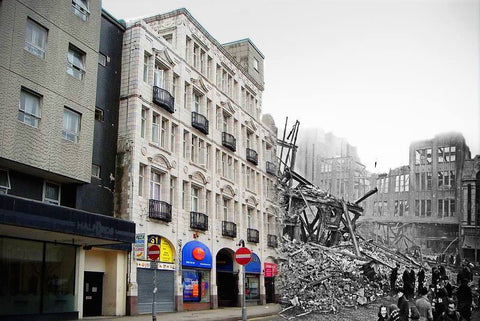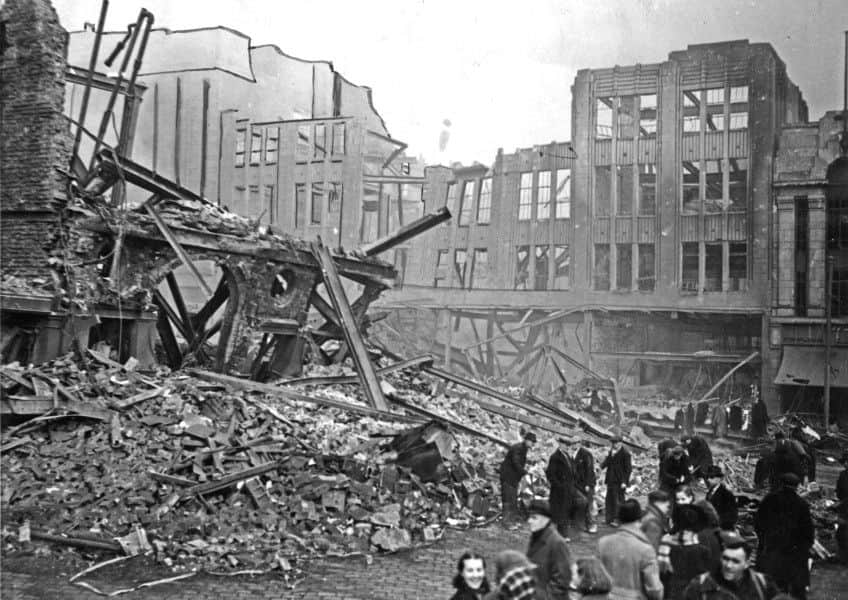During the harrowing nights of the Sheffield Blitz, the city faced unprecedented destruction that reshaped its landscape and history forever. This ordeal began on December 12, 1940, and spanned two devastating nights, answering the critical question of "How long did the Sheffield Blitz last?" with a grim timeline. Amidst this chaos, the Marples Hotel tragedy emerged as a heart-wrenching story of loss, told through the eyes of Doug Lightning, the last fireman left standing from those nights who solemnly recalls the bombing of the Marples Hotel, "Nobody got out of that at all." His memoir appear in our 'Forgotten Memories From A Forgotten Blitz' book.

The collapsed Marples Hotel merged with the present day Fitzalan Square
The Sheffield Blitz led to a significant loss of life, with "How many people died in the Sheffield Blitz?" being answered by the staggering number of over 660 lost - with hundreds more injured. This figure contributes to the broader narrative of "Sheffield Blitz deaths," highlighting the human cost of the bombings. The strategic importance of Sheffield in WWII cannot be overstated. As an industrial powerhouse, "What was Sheffield's role in WW2?" finds its answer in the city's vast contribution to Britain's armament production, making it an inevitable target for German air raids. This directly ties to "Why was Sheffield a target in WW2?", as the city's steel factories were crucial for the war effort even though our 'Sheffield's Date With Hitler' book presents evidence the German tactics were far more or a terror raid with the East End virtually untouched on the heaviest night of the raid.
The locations hit during these raids reveal "Where the bombs fell in the Sheffield Blitz," with a wide spread across the city's industrial areas and civilian districts. "Where was Sheffield bombed in WW2?" further broadens this scope, illustrating that no part of Sheffield was spared, underscoring the indiscriminate nature of aerial warfare. The extent of the bombings, in terms of ordinance, answers "How many bombs were dropped in Sheffield?" with thousands of explosives, including incendiaries that lit the night sky ablaze. WW2 bombs are still regularly dug up - even in the 21st century.
Reflecting on "How many times did Sheffield get bombed in WW2?" reveals that the city faced multiple air raids, although none as catastrophic as the Blitz. This period marked a significant shift from the earlier conflict, as "Was Sheffield bombed in WW1?" is met with details of a single zeppelin raid in 1916. This illustrates the evolution of strategic bombing tactics by the time of the Second World War. Clearly, "Did Sheffield get bombed in WW2?" is answered emphatically, with the Blitz being the most devastating of these attacks. That's in addition to scores of false alarms.
The narrative and memory of the Sheffield Blitz are kept alive through various mediums. "Sheffield blitz photos" - check out our 'Defiant!' book which heavily picture-based - capture the immediacy of the aftermath, while "Sheffield blitz map" (our 'Sheffield's Date With Hitler' book provides details of where every bomb dropped) helps trace the locations and extent of the bombings. Literature like the "Sheffield blitz book" offers in-depth analyses and personal stories, providing a comprehensive view of those dark days. "Sheffield Blitz facts" serve as a testament to the resilience of its people and the city's critical role in the war.
To explore the historical landscape shaped by these events, the "Sheffield Blitz trail" - you'll find it in our 'Countdown to Sheffield Blitz' book - invites locals and visitors alike to walk the paths where history unfolded. The somber reality of "Sheffield Blitz mass grave" reminds us of the collective mourning for lives lost. These elements combine to paint a picture of a city that, despite the horrors it faced, stood resilient against the backdrop of a world at war.
In documenting and remembering the Sheffield Blitz, it is essential to include each facet of its impact—from the strategic significance of Sheffield in the war effort to the personal tragedies that unfolded in its streets and shelters. Doug Lightning's recollections not only remind us of the Marples Hotel's fate but also serve as a poignant call to remember the individuals behind the statistics of "Sheffield Blitz deaths." Through this lens, we honour the memory of those who lived, fought, and perished during those trying times.

